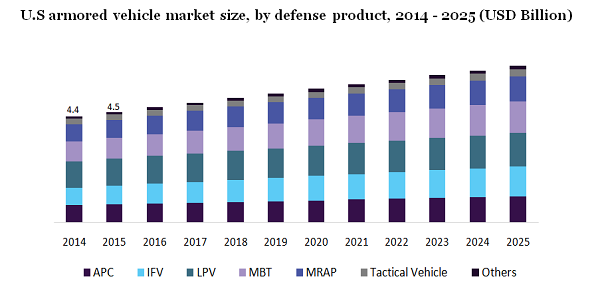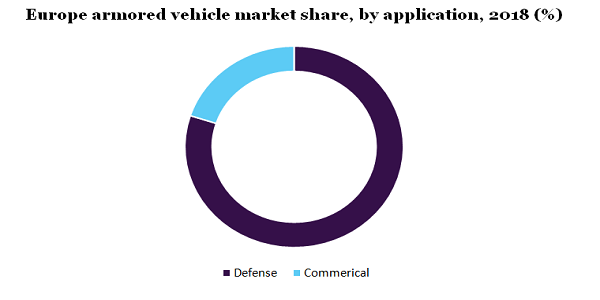- US: +1-408-610-2300
- Toll Free: +1-866-831-4085
- Become a Client
The global armored vehicle market size was worth USD 25.5 billion in 2018. It is projected to register 5.4% CAGR over the forecast duration, 2019 to 2025. Growing focus and spending on safeguarding soldiers from various internal and external threats is driving the market growth. Further, rising awareness regarding the security of commercial properties is also bolstering the market growth.
Increasing spending on multilateral collaboration groups such as the African Union and NATO to counter rising terrorism activities is also driving market growth. In addition, governments are emphasizing procuring the latest pieces of machinery to counter militant attacks and insurgencies. Moreover, rising incidents of communal tension and organized riots and crimes in regions such as MEA and APAC are also encouraging governments to procure armored vehicles.

A rise in defense budgets, especially in the Asia Pacific is projected to positively affect the market growth. Reputation and goodwill are estimated to be vital for market leaders in gaining a contract. Various technical advancements such as the incorporation of sensors and fuel-efficient vehicles are estimated to positively drive the market growth.
The product demand is further fueled by rising cross-boarders terrorism activities. Such activities have created an asymmetric warfare situation among different countries. End-users are inclined highly towards robust, compact, lightweight, and efficient vehicles.
However, budget constraints, especially in European and North American countries, are estimated to hinder industry growth. In addition, increasing raw materials, vehicle assembly, machining equipment, and component cost is projected to negatively affect the market growth over the forecast duration.
Depending on the product, the armored vehicles market is bifurcated into commercial and defense. Further, the defense segment includes light-protected vehicles (LPV), mine-resistant ambush-protected (MRAP), armored personnel carriers (APC), tactical vehicles, and infantry fighting vehicles (IFV) among others. On the other hand, commercial vehicles include limousines, SUVs, buses/vans, and sedans.
Increasing targeted mine attacks on military personal is projected to augment the demand for mine-resistant ambush-protected vehicles demand. While tactical military carriers are primarily designed for military uses, armored personnel carriers are meant to be deployed in high-risk areas.
Based on application, in 2018, the defense category held the largest share in the market. The segment was worth USD 20.5 billion in 2018. Increasing spending by the government on safeguarding the lives of its military personnel during riots, terrorist attacks, and civil wars are predicted to drive the segment growth from 2019 to 2025.

Armored vehicles are also used in various commercial applications. These commercial applications include armed convoys, patrols and protection of VIPs. Rising awareness about personal safety has resulted in increasing demand for leasing and rental protected vans, which, in turn, is supplementing the growth of the commercial segment. An increase in the number of crimes has resulted in the growing demand for these vehicles by banks while transferring money.
In 2018, Asia Pacific accounted for the highest share in the revenue by generating USD 7.9 billion. Growing spending by governments in consolidating their military power amid increasing external and internal threats is attributing to the growth of the region.
Major countries in the Asia Pacific such as South Korea, China, and India are making significant investments in procuring state-of-art armored vehicles. For example, South Korea, in 2018, decided to set up a research establishment to strengthen its military prowess by procuring advanced armored vehicles.
Key market players are also investing hugely in the Asia Pacific to develop hybrid vehicles for border patrolling and maritime activities. Further, increasing demand for medium and lightweight armored vehicles is estimated to bolster regional demand.
The outbreak of COVID-19 has adversely affected the growth of the market. The pandemic has resulted in various governments imposing lockdown, which has adversely affected the supply chain. Disrupted supply chain resulted in manufacturers facing difficulties in procuring raw materials, thereby, delaying the production of armored vehicles. In addition, the various governments have reduced their budget on defense as COVID-19 wreaks havoc on economies. The Asia Pacific, which is the largest shareholder in this market, was the epicenter of the pandemic as countries such as China and India were severely affected. Especially India, which deployed its considerable resources in fighting the pandemics. Thus, the COVID-19 outbreak is estimated to hinder market growth over the next few years.
Major market players are Daimler AG, IVECO, BAE Systems, Elbit Systems, BMW AG, Lockheed Martin Corporation, Thales Group, STAT, Inc., Rheinmetall AG, Navistar, Inc, Textron, Inc., and Oshkosh Defense among others.
Key players are emphasizing the development of innovative products to gain a competitive edge in the market. For example, in 2015, Obrum signed an agreement to develop innovative amphibious 6X6 armored vehicles. Key players are focusing on collaborating with advanced components to manufacture products with innovative technology. Companies are also emphasizing strengthening their foothold and building reputation as it helps them in getting contracts. For example, Oshkosh Corp. received a whopping USD 1.69 billion contracts, November 2018, from the U.S. government to manufacture over 6,000 army vehicles.
|
Attribute |
Details |
|
The base year for estimation |
2018 |
|
Actual estimates/Historical data |
2014 - 2017 |
|
Forecast period |
2019 - 2025 |
|
Market representation |
Revenue in USD Million, Volume in Thousand Units, and CAGR from 2019 to 2025 |
|
Regional scope |
North America, Europe, Asia Pacific, Latin America, Middle East & Africa |
|
Country scope |
U.S., Canada, Russia, U.K., India, Japan, China, and Brazil |
|
Report coverage |
Revenue forecast, company ranking, competitive landscape, growth factors, and trends |
|
15% free customization scope (equivalent to 5 analyst working days) |
If you need specific information that is not currently within the scope of the report, we will provide it to you as a part of the customization |
This report forecasts revenue growth at global, regional, and country levels, and provides an analysis of the latest industry trends in each of the sub-segments from 2014 to 2025. For the purpose of this study, Million Insights has segmented the global armored vehicle market report on the basis of application, product, and region:
• Application Outlook (Volume, Thousand Units; Revenue, USD Million, 2014 - 2025)
• Defense
• Commercial
• Product Outlook (Volume, Thousand Units; Revenue, USD Million, 2014 - 2025)
• Defense
• Armored Personnel Carrier (APC)
• Infantry Fighting Vehicles (IFV)
• Light Protected Vehicles (LPV)
• Main Battle Tanks (MBT)
• Mine-resistant Ambush Protected (MRAP)
• Tactical Vehicle
• Others
• Commercial
• Bus/Van
• Limousine
• Sedan
• SUV
• Others
• Regional Outlook (Volume, Thousand Units; Revenue, USD Million, 2014 - 2025)
• North America
• The U.S.
• Canada
• Europe
• Russia
• The U.K.
• the Asia Pacific
• China
• India
• Japan
• Latin America
• Brazil
• Middle East & Africa (MEA)


Research Support Specialist, USA